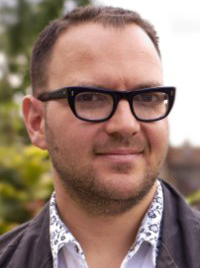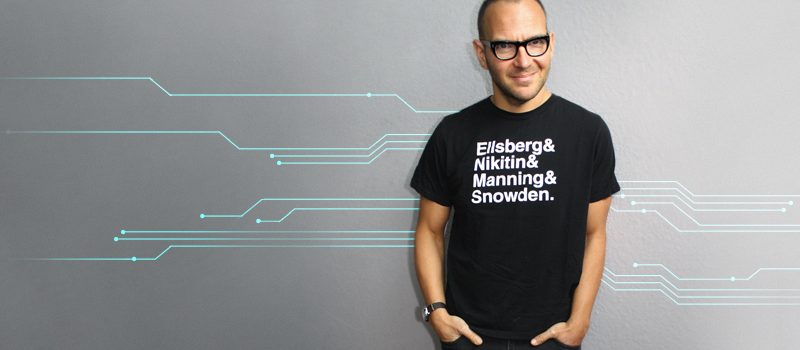Cory Doctorow: Jeannette Ng Was Right: John W. Campbell Was a Fascist
[All opinions expressed by commentators, guest bloggers, reviewers, and interviewees are solely their own and do not reflect the opinions of Locus magazine or its staff.]

At the Hugo Awards ceremony at this summer’s Dublin Worldcon, Jeannette Ng was presented with the John W. Campbell Award for Best New Writer. Ng gave an outstanding and brave acceptance speech in which she called Campbell – the award’s namesake and one of the field’s most influential editors – a “fascist” and expressed solidarity with the Hong Kong pro-democracy protesters.
I am a past recipient of the John W. Campbell Award for Best New Writer (2000) as well as a recipient of the John W. Campbell Memorial Award (2009). I believe I’m the only person to have won both of the Campbells, which, I think, gives me unique license to comment on Ng’s remarks, which have been met with a mixed reception from the field.
I think she was right – and seemly – to make her remarks. There’s plenty of evidence that Campbell’s views were odious and deplorable. It wasn’t just the story he had Heinlein expand into his terrible, racist, authoritarian, eugenics-inflected yellow peril novel Sixth Column. Nor was it Campbell’s decision to lean hard on Tom Godwin to kill the girl in “Cold Equations” in order to turn his story into a parable about the foolishness of women and the role of men in guiding them to accept the cold, hard facts of life.
It’s also that Campbell used his op-ed space in Astounding to cheer the murders of the Kent State 4. He attributed the Watts uprising to Black people’s latent desire to return to slavery. These were not artefacts of a less-englightened era. By the standards of his day, Campbell was a font of terrible ideas, from his early support of fringe religion and psychic phenomena to his views on women and racialized people.
So when Ng held Campbell “responsible for setting a tone of science fiction that still haunts the genre to this day. Sterile. Male. White. Exalting in the ambitions of imperialists and colonisers, settlers and industrialists,” she was factually correct.
Not just factually correct: she was also correct to be saying this now. Science fiction (like many other institutions) is having a reckoning with its past and its present. We’re trying to figure out what to do about the long reach that the terrible ideas of flawed people (mostly men) had on our fields. We’re trying to reconcile the legacies of flawed people whose good deeds and good art live alongside their cruel, damaging treatment of women. These men were not aberrations: they were following an example set from the very top and running through the industry and through fandom, to the great detriment of many of the people who came to science fiction for safety and sanctuary and community.
It’s not a coincidence that one of the first organized manifestations of white nationalism as a cultural phenomenon within fandom was in the form of a hijacking of the Hugo nominations process. While fandom came together to firmly repudiate its white nationalist wing, those people weren’t (all) entryists who showed up to stir up trouble in someone else’s community. The call (to hijack the Hugo Award) was coming from inside the house: these guys had been around forever, and we’d let them get away with it, in the name of “tolerance” even as these guys were chasing women, queer people, and racialized people out of the field.
Those same Nazis went on to join Gamergate, then became prominent voices on Reddit’s /r/The_Donald, which was the vanguard of white nationalist, authoritarian support for the Trump campaign.
The connections between the tales we tell about ourselves and our past and futures have a real, direct outcome on the future we arrive at. White supremacist folklore, including the ecofascist doctrine that says we can only avert climate change by murdering all the brown people, comes straight out of SF folklore, where it’s completely standard for every disaster to be swiftly followed by an underclass mob descending on their social betters to eat and/or rape them (never mind the actual way that disasters go down).
When Ng picked up the mic and told the truth about Campbell’s legacy, she wasn’t downplaying his importance: she was acknowledging it. Campbell’s odious ideas matter because he was important, a giant in the field who left an enduring mark on it. No one questions that. What we want to talk about today is what Campbell’s contribution was, and what it means.
After Ng’s speech, John Scalzi published a post where he pointed out that many of the people who were angry at Ng “knew Campbell personally,” or “idolize and respect the writers Campbell took under his wing… Many if not most of these folks know about his flaws, but even so it’s hard to see someone with no allegiance to him, either personally or professionally, point them out both forcefully and unapologetically. They see Campbell and his legacy abstractly, and also as an obstacle to be overcome. That’s deeply uncomfortable.”
Scalzi’s right, too: the people who counted Campbell as a friend are authentically sad to confront the full meaning of his legacy. I feel for them. It’s hard to reconcile the mensch who was there for you and treated his dog with kindness and doted on his kids with the guy who alienated and hurt people with his cruel dogma.
Here’s the thing: neither one of those facets of Campbell cancels the other one out. Just as it’s not true that any amount of good deeds done for some people can repair the harms he visited on others, it’s also true that none of those harms cancel out the kindnesses he did for the people he was kind to.
Life is not a ledger. Your sins can’t be paid off through good deeds. Your good deeds are not cancelled by your sins. Your sins and your good deeds live alongside one another. They coexist in superposition.
You (and I) can (and should) atone for our misdeeds. We can (and should) apologize for them to the people we’ve wronged. We should do those things, not because they will erase our misdeeds, but because the only thing worse than being really wrong is not learning to be better.
People are flawed vessels. The circumstances around us – our social norms and institutions – can be structured to bring out our worst natures or our best. We can invite Isaac Asimov to our cons to deliver a lecture on “The Power of Posterior Pinching” in which he would literally advise men on how to grope the women in attendance, or we can create and enforce a Code of Conduct that would bounce anyone, up to and including the con chair and the guest of honor, who tried a stunt like that.
We, collectively, through our norms and institutions, create the circumstances that favor sociopathy or generosity. Sweeping bad conduct under the rug isn’t just cruel to the people who were victimized by that conduct: it’s also a disservice to the flawed vessels who are struggling with their own contradictions and base urges. Creating an environment where it’s normal to do things that – in 10 or 20 years – will result in your expulsion from your community is not a kindness to anyone.
There are terrible men out there today whose path to being terrible got started when they watched Isaac Asimov grope women without their consent and figured that the chuckling approval of all their peers meant that whatever doubts they might have had were probably misplaced. Those men don’t get a pass because they learned from a bad example set by their community and its leaders – but they might have been diverted from their path to terribleness if they’d had better examples.
They might not have scarred and hurt countless women on their way from the larval stage of shittiness to full-blown shitlord, and they themselves might have been spared their eventual fate, of being disliked and excluded from a community they joined in search of comradeship and mutual aid. The friends of those shitty dudes might not have to wrestle with their role in enabling the harm those shitty dudes wrought.
Since her acceptance speech, Ng has been subjected to a triple-ration of abuse and vitriol, much of it with sexist and racist overtones. But Ng’s bravery hasn’t just sparked a conversation, it’s also made a change. In the weeks after Ng’s speech, both Dell Magazines (sponsors of the Campbell Award) and the James Gunn Center at the University of Kansas at Lawrence (who award the other Campbell Award at an event called “The Campbell Conference”) have dropped John W. Campbell from the names of their awards and events. They did so for the very best of reasons.
As a winner of both Campbell Awards, I’m delighted by these changes. Campbell’s impact on our field will never be truly extinguished (alas), but we don’t need to celebrate it.
Back when the misogynist/white supremacist wing of SF started to publicly organize to purge the field of the wrong kind of fan and the wrong kind of writer, they were talking about people like Ng. I think that this is ample evidence that she is in exactly the right place, at the right time, saying the right thing.
[Edited to correct Asimov speech reference]
Cory Doctorow is the author of Walkaway, Little Brother, and Information Doesn’t Want to Be Free (among many others); he is the co-owner of Boing Boing, a special consultant to the Electronic Frontier Foundation, a visiting professor of Computer Science at the Open University and an MIT Media Lab Research Affiliate.
This article and more like it in the November 2019 issue of Locus.
 While you are here, please take a moment to support Locus with a one-time or recurring donation. We rely on reader donations to keep the magazine and site going, and would like to keep the site paywall free, but WE NEED YOUR FINANCIAL SUPPORT to continue quality coverage of the science fiction and fantasy field.
While you are here, please take a moment to support Locus with a one-time or recurring donation. We rely on reader donations to keep the magazine and site going, and would like to keep the site paywall free, but WE NEED YOUR FINANCIAL SUPPORT to continue quality coverage of the science fiction and fantasy field.









I can only say, I hope the assholes will learn something from your article. Thanks.
An alternative view:
https://quillette.com/2019/11/05/science-fiction-purges-its-problematic-past/
Thanks for the link. Interesting article.
Wow, there’s a whole lot of false assumptions, bad-faith arguments, and ahistorical nonsense in there.
So he was a racist and sexist. That’s well known. How was he a fascist exactly? What type of fascism did he support? Which fascist figures? This isn’t a very informative article.
Well you have to keep in mind that the labels fascist and even Nazi have been so thoroughly diluted in meaning by just this type of misuse that its practically come to mean anyone that generally offends your far left social consciousness. Sad to see this from a wordsmith.
The Kent State shootings that John Campbell felt were deserved are referred to in the article, which seems to endorse a fascist-like lethal response to a challenge to authority.
You are 100% correct. This article is gaslighting, hypocrisy, and projection of the highest order. Thankfully, it wasn’t totally worthless. I just picked up a copy of Sixth Column on Doctorow’s recommendation.
It is really bad, and that is Campbells fault. It is racist.
Campbell liked to say things to start controversies. There are some overtones in his editorials and such that maybe he was a racist- many men born when he was were. Or maybe he was just trying to stir things up.
But Campbell was in no way a fascist. Ng and Cory here are basically trolling when they say that.
You can’t argue with arrogance.
I put my hopes in drugs and/or meditation.
No. The entire point of the Sad Puppies movement was to make fandom more open and inclusive of conservative and libertarian writers, many of whom are also people of color. Not that we care about race one way or the other, and that’s kind of the point.
Larry Correia’s Saga of the Forgotten Warrior (arguably his best work) takes place in an Indian-inspired fantasy world populated by brown-skinned people. Brad Torgersen has been happily married to a woman of color for more than a decade. Sarah Hoyt is a Latinx immigrant.
The most racist people in SF right now are writers like you, Mr. Doctorow, who see everything in terms of “priviledge” and “oppression.”
To put it into perspective, the person who is throwing ad hominem attacks out is an author who literally uses a photo of him doing the man-duck-face as his profile image, can’t spell *privilege*, went to a Mormon university, who’s main character is named the not at all hit-over-the-head-with-a-cricket-bat “Jeremiah” who also happens to be lucky enough to have an arranged marriage with a woman that he doesn’t need to listen to (because they can’t speak the same language), and who tries to pass off hilarious blurbs like “When Mariya’s family leaves for the Far Outworlds, she realizes that her best friend’s husband may be the last good man she meets. She doesn’t want to break up their marriage, but she doesn’t want to be alone either. Sharing a husband seems like the best option—until everything falls apart.”
I wish it were a joke, but no, this sheltered man who went to a crackpot religious university actually writes about male power fantasies like sexually sharing women, saving women from space pirates and saving women dying of famine and tries to pass them off as “science fiction”.
All of this of course is on the side as he crusades about the Sad
Let’s just say that there probably isn’t a more worthless opinion one could seek out in regards to the topic of progression. A guy complaining about privilege, anti-oppression, anti-racism and anti-fascism who espouses the views of a group created to provide a safe space for people that have terrible views.
The irony won’t be lost on many.
Thanks for the smile DKK!
If this true, how come they keep lying?
https://www.reddit.com/r/BestOfOutrageCulture/comments/d327ng/conservative_author_seems_to_horribly_project/
How come they defend scumbags like Vox Day? https://www.reddit.com/r/BestOfOutrageCulture/comments/f0e2nx/looking_back_at_the_hypocrisy_of_the_sad_puppies/
No. That’s actually not the point at all.
Contrary to your false assertion, the author expressly recognizes that Campbell, and by extension all of the cohort of writers and fans guilty of misogynistic/racist/homophobic conduct, are neither entirely good nor entirely evil people. They, like all of us, are combinations of both….but here’s the sticking point: we cannot let the good someone has done keep us as a community from speaking truth about the wrongs they have done.
Keep in mind that right and wrong have their elements of subjectiveness to them. I’m sure there are things I honestly and sincerely believe are perfectly acceptable that my kids or grandkids will be horrified by. It’s not about holding PAST conduct to a present standard; it’s about having an honest conversation about Jobe past conduct leads to and entrenched present conduct and why we need to be able to address actions that hurt/minimalist members of our community.
I mean look, I’m as boringly middle class cis-gendered white male as it gets, and even I can understand that if an icon in the field gives public tips on how to grope women (to use the Asimov reference) that it cannot be surprising that women would feel that they weren’t welcome. Are you really suggesting that conduct is ok? I have some personal reservations when it comes to the scope of application of ethical norms to fiction, but clearly there’s a link between the normalization of behavior in our fiction and our acceptance of that behavior in our public and private lives.
“You (and I) can (and should) atone for our misdeeds. We can (and should) apologize for them to the people we’ve wronged. We should do those things, not because they will erase our misdeeds, but because the only thing worse than being really wrong is not learning to be better.”
That is brilliant and powerful. Best think I’ve heard all week.
Cory, thank you for this piece. This in particular:
“Just as it’s not true that any amount of good deeds done for some people can repair the harms he visited on others, it’s also true that none of those harms cancel out the kindnesses he did for the people he was kind to.”
It would really help if more of us were able and willing to both sides of those we admire and those we despise.
So many sad puppies being sad… Ya know, it’s ok to be hurt that someone you looked up to turned out to be a piece of shit. How you react is a good definition of your character. Being ok with their behavior, defending it/them, constantly picking fights and harassing anyone who in any way says something you don’t like because you’ve twisted your own personal reality so badly, just shows you’re incapable of behaving like a mature, intelligent adult… It speaks volumes about what you are. Plenty of us grew up reading, being fans of, even loving the works of people who turned out to be outright garbage or just highly questionable and uncomfortable… Marion Zimmer Bradley, Woody Allen, L. Ron Hubbard, serial groper Asimov, Orson Scott Card… It’s a long list. If you’re ok with what a person is, so be it, but that doesn’t give you the right to attack someone else who is calling out their garbage behavior in a mature intelligent fashion. That just makes you garbage too. Ng and Cory here have completely valid views here about this guy. It’s not like Campbell was even slightly subtle about his views any more than HP Lovecraft was. Some of the comments here are shockingly idiotic and juvenile, with inane logic (attacking someone for their headshot? Really? Suggesting someone is a fine human being and *definitely* not at all terrible because they married someone of color? Yea, do better.). At some point in the era of the internet, we either lost the ability to understand bias and the entire concept of debating without attacking or else the internet just allowed the vast overflow of ignorance to shine through finally. An intelligent educated person should, at minimum be able to understand that nothing and no one is all good or all bad. They should be able to critique something they love, tear it apart, define all its flaws, and understand that’s ok (and do the opposite). But for many, that’s a bridge too far. You live in a binary land of delusions where you’re so desperate to matter that you just inflict yourselves on random strangers in the most vile way. SFF should be for everyone, everywhere who wants to enjoy it. It should always have been, but it wasn’t. It still isn’t, but it’s moving in the right direction. If you really have a problem with that, please see yourself out. You make the people who love this beautiful nerdy heady stuff look bad right along with you.
Honest question: if science fiction is for everyone, is it also for people who voted for Trump?
Yes
So you just casually smeared some people who not only have no proven deeds to atone for, but who can point to backing for their innocence of wrongdoing . That kind of casual McCarthyism is the mirror image of the prejudices you profess to abhor
If they can actually read? Sure. Newt Gingrich has written a few sci-fi novels and, obviously, there are quite a few right-wing sci-fi authors out there. I’ve also met plenty of Trekkies who are hardcore right and apparently incapable of understanding the irony of that. Hell, isn’t Baen an entire publisher with a bizarro Libertarian bent…? Take any book at all, no matter the genre…book, movie, comic, song, whatever, the individual will read something different in it. Likely something the author didn’t consider, definitely something other readers might never read into it.
You mean being a racist, groping women, and generally assuming that the deaths of the lesser sorts are okay is what being a white man is? At least in your mind.